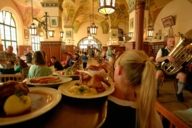
“In München steht ein Hofbräuhaus – oans, zwoa, g'suffa…” (“There's a Hofbräuhaus in Munich – one, two, down the hatch...”) That is the opening line of the 1935 song that made the Hofbräuhaus am Platzl famous all over the world.
It all began a few centuries earlier with the Bavarian Duke Wilhelm V, who founded a brewery in 1589, intending for it only to supply beer to the Wittelsbach court. This first Hofbräuhaus was just a few steps away from today's Hofbräuhaus – though today only the Memorandum of Association remains.
Clearly the nobles and servants of the court enjoyed the beer it brewed, as its output was soon unable to meet the huge demand. Consequently, the new Bavarian ruler Maximilian I commissioned the building of a second brewery on the Platzl in 1607, laying the historical foundation for the modern-day Hofbräuhaus.
In 1828 King Ludwig I issued a decree officially declaring the court alehouse to be an alehouse of the people, permitting the general public to buy beer from it – much to the horror of Munich's publicans and private brewers, who worried about keeping their customers.
The Hofbräuhaus continued to increase in popularity among tourists from all over the world and locals alike. Prominent beer lovers such as Wolfgang Amadeus Mozart, Empress Elisabeth of Austria (known as Sisi by most people) and Lenin and his wife were soon stopping by. Soon the place was bursting at the seams, and in urgent need of an extension.

As a result, the brewing equipment was relocated to the Haidhausen district (where the Hofbräukeller restaurant is located today) in 1896. The old brewery took on its current appearance as part of a Renaissance Revival-style renovation, during which works it was also significantly extended to make it the larger tavern we know today.
The traditional beer hall in the heart of the city is recognised worldwide as the embodiment of Bavarian beer culture. The Schwemme bar on the ground floor is the centrepiece of the three-storey building: where brewing equipment once stood over a century ago, more than 1,000 people can now drink beer and enjoy Bavarian specialities. In the centre of the Schwemme is the music podium, where various brass bands play each day, making sure the atmosphere is just right.
Guests who prefer things a little quieter can head to the Bräustüberl café on the first floor, which is especially prized by the locals for its historic ambience. The Festsaal (festival hall) on the top floor contains a podium where folk singers and music groups can perform. This room is also used as a venue for folk dancing lessons.
Those wishing to escape the hustle and bustle of Munich city centre in the summer might be able to snag a shady spot in the Hofbräuhaus beer garden, which is accessed via the imposing archway.
Although many visitors to Munich would rank the Bierpalast (beer hall) among the top ten attractions in the Bavarian capital, it would not be right to label the Hofbräuhaus as purely a tourist hotspot. On the contrary: half the daily visitors are regulars who still appreciate Bavarian tradition in the modern world.

Locals' enduring love for their Hofbräuhaus am Platzl is made especially clear in Ludwig Thoma's 1911 humorous satire “Ein Münchner im Himmel” (“A Munich Man in Heaven”). It tells the story of porter Alois Hingerl, who dies and ends up in Heaven as the angel Aloisius. But he doesn't like his new lodgings because he misses Bavarian “culture”: there is neither beer nor snuff on high, and singing and rejoicing really aren't his thing. It all makes him rather grumpy, and so God eventually appoints him as a messenger responsible for delivering divine advice to the Bavarian government.
However, en route Aloisius makes a little detour to his usual spot in the Hofbräuhaus; feels as though he is in heaven once he is there; orders one beer after another; forgets his divine mission; and is reportedly still sitting there today (with far-reaching consequences for the Bavarian government)! Those blessed with the right kind of sensory sensitivity may perhaps sense his presence at the Stammtisch (regulars' table).
You can find an overview of traditional Munich city centre restaurants here: www.innenstadtwirte.de